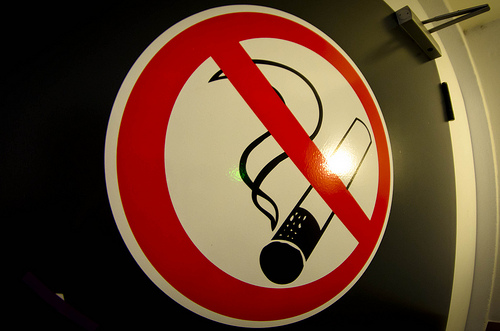
Pump some oxygen into your brain
It is known that practicing a physical activity not only keeps your body young, strong and full of energy; it does the same for your brain. Studies have shown that old adults that exercise on a regular basis have higher scores in learning and memory tests, compared to adults that don’t exercise. Moderate exercise, such as running, swimming or even walking for 30 minutes, 3 times a week, can help you improve your memory skills by keeping your blood flowing and delivering oxygen to your brain cells; also, exercise keeps your senses and reflexes sharp. Finally, physical activity reduces your risk of diabetes, high blood pressure and cholesterol, all which are related with memory loss.
- Important notification about information and brand names used in this slideshow!
- Photo courtesy of Maxwell GS by Flickr : www.flickr.com/photos/maxwellgs/4266595533/
- www.health.harvard.edu/newsweek/Preventing_memory_loss.htm
- http://health.yahoo.net/articles/mental-health/photos/how-prevent-memory-loss#0
- http://www.mayoclinic.com/health/memory-loss/HA00001
- http://www.prevention.com/health/brain-games/tips-prevent-memory-loss
- BHERER, L., ERICKSON, K. I. & LIU-AMBROSE, T. 2013. A Review of the Effects of Physical Activity and Exercise on Cognitive and Brain Functions in Older Adults. J Aging Res, 2013, 657508.

Healthy body, healthy mind
Picture your brain and your brain cells as if they were made out of clay: even though brain cells don’t proliferate, and we lose quite a few during our lives, brain connexions can be created or rearranged. In order for us to maintain a healthy brain, capable of making new connexions, we have to keep it “fit” and strong by staying mentally active. Instead of using the calculator, try to sort out your weekly bills mentally; choose a book or a magazine and read a few pages every night; do the newspaper crossword puzzle or keep a journal. All these activities will keep your brain cells in shape and will prevent memory loss.
- Important notification about information and brand names used in this slideshow!
- Photo courtesy of Sara by Flickr : www.flickr.com/photos/sarae/115193590/
- www.mayoclinic.com/health/memory-loss/HA00001
- http://www.health.harvard.edu/newsweek/Preventing_memory_loss.htm
- http://www.alz.org/alzheimers_disease_10_signs_of_alzheimers.asp?gclid=CNjcjrfGm7oCFbDMtAodMTMAwQ

It's never too late to learn
Learning and memory go hand by hand. When we acquire new knowledge we then have to store that knowledge into our memory, so we don’t have to learn it again. As you can see then, learning is the best activity that we can do to keep our memory working and prevent it from getting all dusty. It’s never too late to learn a new hobby, like doing puzzles or mind games; there are lots of free courses in photography, gardening, painting and cooking on the Internet. Learning a different language is also helpful and free courses are also available. Go to your nearest library and read about something that always interested you, but never had the chance to focus on, like Mayan culture, railroads or fossils.

A healthy diet for your neurons
There are some foods that you can eat to prevent memory loss and keep your neurons happy and full of energy. Fish rich in Omega 3, like salmon, are great for your brain. If you like salads, use extra-virgin olive oil as dressing, as it is another source of good fatty acids that maintain your brain cells working properly and prevent high cholesterol levels. Any kind of berries and other vegetables, such as beetroot and spinach, are full of antioxidants, which protect your brain from free radicals, preventing neuronal damage. Nuts and seeds also provide you with good fats and green tea is another excellent source of antioxidants.

Mess makes you forget
If you have everything scattered around and do not keep records of your appointments or other things to do, you will certainly start forgetting things. Our memory is amazing and has a great storage capacity, but sometimes it needs a little help. Buy yourself a planner and write down important things to do, such as doctor’s appointments, meetings, holidays, your groceries list, etc. Also, assign a special place at home to leave your keys and wallet, so you don’t spend one hour looking for them the next time you want to go out. If you have everything organized, information in your brain will also have a specific place and it will be easier for you to remember.
- Important notification about information and brand names used in this slideshow!
- Photo courtesy of Geek Calendar by Flickr : www.flickr.com/photos/geekcalendar/4683130187/
- www.health.harvard.edu/newsweek/Preventing_memory_loss.htm
- http://www.mayoclinic.com/health/memory-loss/HA00001
- http://www.helpguide.org/life/prevent_memory_loss.htm

Keep calm and take care of your brain
Have you noticed that, when you are under a stressful situation, you tend to forget the simplest things? Stress and anxiety promote the liberation of a hormone called cortisol, which affects the memory process and makes it harder for you to store and recall information. An anxious person tends also to be distracted and lacks of focus, mainly because there is so much going on in the brain, at the same time. So, when trying to remember something under stress, is like looking for a needle in haystack. If you are anxious and stressed, try to sleep and eat well, and find a moment during your day to just sit down and breathe. This will give you a feeling of calm and will give your brain a break.
- Important notification about information and brand names used in this slideshow!
- Photo courtesy of Marco Raaphorst by Flickr : www.flickr.com/photos/raaphorst/148634994/
- www.calmclinic.com/anxiety/symptoms/memory-problems

Multitasking is not as good as you thought
Focusing on one thing at a time is the key to keep your memories intact. Sometimes it might seem impossible to do this, but believe me, it is better to spend a few minutes on each task, rather than splitting one minute between three. This will not only help you record the information in your brain successfully, but will also avoid those desperation moments when you can’t recall something you did earlier that day, or at least you thought you did. If you now you tend to be distracted, write down a routine with the main activities you need to complete the next day, before going to bed. You don’t have to follow this plan exactly as you wrote it, but it might help you stay focused.

Check your cholesterol and iron levels
A healthy diet is always recommended not only to prevent memory loss, but also to keep our entire bodies in optimum conditions. Specifically, when it comes to taking care of your brain, doctors suggest controlling your cholesterol and iron levels. This is mainly to avoid high cholesterol related problems, like obstruction of the blood flow to your brain, neuronal damage and increased risk of stroke. Alterations in iron levels also put you in risk of memory loss. Undernourished patients, as well as patients with high iron levels, show memory problems and increased risk of suffering Alzheimer’s disease.
- Important notification about information and brand names used in this slideshow!
- Photo courtesy of Alexander Torrenegra by Flickr : www.flickr.com/photos/alextorrenegra/3339393321/
- www.mayoclinic.com/health/statin-side-effects/MY00205
- http://www.sciencedaily.com/releases/2012/04/120410101908.htm
- PRASANTHI, J. R., SCHRAG, M., DASARI, B., MARWARHA, G., DICKSON, A., KIRSCH, W. M. & GHRIBI, O. 2012. Deferiprone reduces amyloid-beta and tau phosphorylation levels but not reactive oxygen species generation in hippocampus of rabbits fed a cholesterol-enriched diet. J Alzheimers Dis, 30, 167-82.

Forget about smoking!
Studies have shown that people that currently smoke struggle to remember things, compared to people that had never smoked, or had previously smoked but quit. It is not known however, if substances present in cigarettes directly cause brain damage or if this is related to secondary health conditions, such as high blood pressure and stroke, altered lung function and altered blood flow to the brain. In any case, smoking doesn’t have any health benefit and quitting this habit seems like the best choice. If you need help with this, contact your doctor to review the options you have to get through this process.
- Important notification about information and brand names used in this slideshow!
- Photo courtesy of Ken Hawkins by Flickr : www.flickr.com/photos/khawkins04/5993085235/
- www.health.harvard.edu/newsweek/Preventing_memory_loss.htm
- HEFFERNAN, T. M., O'NEILL, T. S. & MOSS, M. 2012. Smoking-related prospective memory deficits in a real-world task. Drug Alcohol Depend, 120, 1-6.

Sleep like a baby
Memories are fixed in our brain while we sleep. Also, it is the perfect time for our brain to take a break from daily activities. A good sleep must last between 7 and 8 hours, everyday. In order to rest properly, avoid heavy night meals and intense exercise before going to bed. Avoid coffee or other beverages that contain caffeine and try not to take naps during daytime, in order not to disrupt your sleeping cycle. If you experience trouble to sleep do not self-medicate and consult your physician; only he or she will know if you need medication to help you with your sleeping problems. Otherwise, just try to relax by reading a book or meditating before going to bed.
- Important notification about information and brand names used in this slideshow!
- Photo courtesy of eyesogreen by Flickr : www.flickr.com/photos/25960000@N05/2679914897/
- www.ncbi.nlm.nih.gov/pubmedhealth/behindtheheadlines/news/2013-01-29-does-getting-more-sleep-reduce-memory-loss/
- http://www.health.harvard.edu/newsweek/Preventing_memory_loss.htm



























Your thoughts on this
Loading...